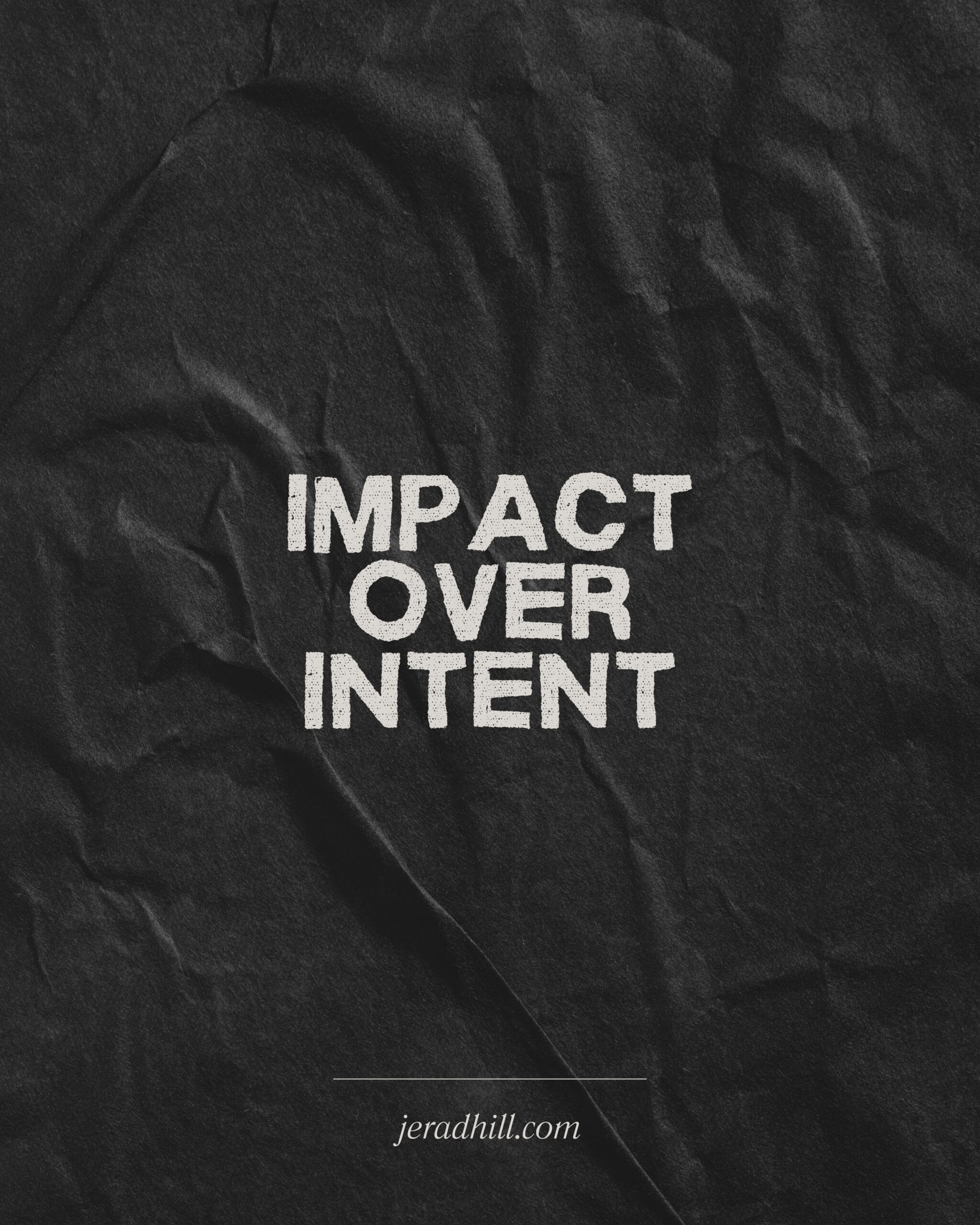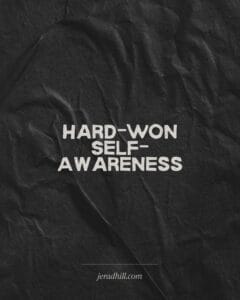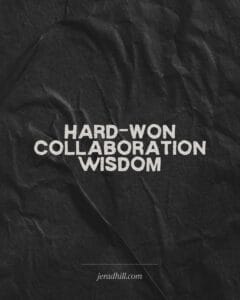How my good intentions often create bad outcomes
I’ve been doing a lot of reflecting lately on why my attempts to help often create distance instead of connection. Why my observations, which I genuinely believe could be useful, land like criticism. Why people get defensive when I’m trying to be collaborative.
The truth is, I have some real communication patterns that make it harder for people to hear me. Not because what I’m saying is wrong, but because how I’m saying it triggers defensiveness before we ever get to the substance.
So here are five patterns I’ve identified, the unintended outcomes they create, and how I’m working to change them.
1. I Overgeneralize When I Should Specify
What I Do: When I see a pattern or problem, I describe it broadly rather than specifically. Instead of saying “In Tuesday’s meeting, when we discussed the budget, I noticed we didn’t have clarity on next steps,” I say something like “We tend to have meetings without clear outcomes.”
I do this partly to avoid finger-pointing. If I make it about “we” or “the system,” it feels less accusatory than pointing at a specific person or moment. But also because I genuinely see the pattern as bigger than one instance.
The Unintended Outcome: People hear the generalization and immediately apply it to themselves, but in the worst possible way. “We tend to have meetings without clear outcomes” becomes “Jerad thinks I’m a bad leader who wastes everyone’s time.”
Or they hear it as an indictment of everything rather than one specific thing: “He’s saying EVERYTHING we do is broken.”
Even when my generalization is accurate (it IS a pattern across multiple instances), packaging it that way makes people feel unfairly characterized and shuts down their ability to hear what I’m actually observing.
How I’m Working to Improve: I’m learning to:
- Start with specific examples: “In Tuesday’s meeting, I noticed we ended without clarity on who’s doing what next. Can we talk about how to build that into our meeting structure?”
- Use ‘I’ statements about my experience: “I often leave meetings unclear on next steps” rather than “We don’t have clear outcomes”
- Separate observation from interpretation: “I noticed X happened” rather than “This shows we have a problem with Y”
- Check my generalization: Before I say it, ask myself: “Am I describing a pattern accurately, or am I inflating this into a universal truth?”
The goal: Help people see what I’m seeing without making them feel like I’m condemning everything they do.
2. I Accumulate Observations Instead of Addressing Things Early
What I Do: I notice something that seems off or could be improved. Instead of mentioning it in the moment, I file it away. Then I notice another thing. And another. I tell myself I’m being patient, giving people time, not making mountains out of molehills.
But what actually happens is I build up this mental case file. And then eventually, when the pattern becomes undeniable to me or when something finally pushes me to speak up, I present this massive collection of evidence all at once.
The Unintended Outcome: When I finally do speak up, it feels to the other person like an ambush. “Where is all this coming from? Why didn’t you say something sooner? Have you been keeping a list of everything I’ve done wrong?”
It creates the impression that:
- I’ve been secretly building a case against them
- I’m holding grudges
- Our relationship wasn’t as good as they thought (because I was noticing all these issues without saying anything)
- The problem is bigger than it actually is (because I’m presenting months of accumulated observations at once)
What I thought was patience and grace actually comes across as passive-aggressive scorekeeping.
How I’m Working to Improve: I’m learning to:
- Address things when they’re small: “Hey, I noticed [specific thing]. Can we talk about that?” rather than waiting until I have a pattern
- Distinguish between minor and major: Not everything needs to be addressed. Some things really are molehills. But when something bothers me enough that I’m mentally noting it, that’s a sign I should probably mention it
- Set a time limit: If something bothers me more than 48 hours after it happens, I need to bring it up rather than file it away
- Frame it as curiosity, not accusation: “I noticed X. I’m curious about that, can you help me understand what was going on?”
The goal: Create space for ongoing feedback rather than occasional data dumps.
3. I Lead With Problems Instead of Affirmation
What I Do: When I’m thinking about a system, organization, or relationship, my brain naturally goes to: “What’s not working? What could be better? Where are the gaps?”
It’s how I’m wired. I see the potential in things, which means I also immediately see the distance between where we are and where we could be.
So when I engage, I often jump straight to: “Here’s what I’m noticing that could improve.” I assume the affirmation is implied (I wouldn’t be here if I didn’t care; I wouldn’t invest time if I didn’t see value).
The Unintended Outcome: People don’t hear the implied affirmation. They just hear criticism.
And when every interaction with me involves me pointing out problems, I become exhausting to be around. Even if I’m right about the problems. Even if my heart is genuinely to help.
It creates this dynamic where people start to dread conversations with me because they know I’m going to point out what’s not working. And that makes them less receptive to the actual valuable observations I’m bringing.
How I’m Working to Improve: I’m learning to:
- Start with what’s working: Before I mention what could improve, explicitly name what I see that’s good, valuable, working well
- Assume nothing is implied: Just because I care doesn’t mean people know I care. Just because I see value doesn’t mean they know I see it. Say it out loud.
- Ask before offering observations: “I’ve noticed a few things. Would it be helpful if I shared them?” gives people agency rather than feeling like I’m imposing my analysis
- Celebrate progress: Notice and name when things improve, when people grow, when changes happen; not just when problems exist
The goal: Create a ratio where people experience affirmation and problem-solving from me, not just problem-identification.
4. I Assume Others See What I See
What I Do: When I present an observation or idea, I often present it with certainty and completeness. In my mind, I’ve been observing this for weeks or months. I’ve connected the dots. I’ve thought through the implications. It’s clear to me.
So I present it as clear, assuming others have access to the same data I’ve been processing.
The Unintended Outcome: To others, it sounds like I’m:
- Being arrogant (”He thinks he has it all figured out”)
- Not interested in their perspective (”He’s already decided what the problem is”)
- Condescending (”He thinks we’re too dumb to see what he sees”)
Even worse, when they don’t immediately agree with my observation, I can get frustrated because it seems so obvious to me. And that frustration probably shows, which makes them even more defensive.
How I’m Working to Improve: I’m learning to:
- Show my work: “Here’s what I’ve been noticing… [specific examples]… and here’s the pattern I think I’m seeing. Does that match your experience?”
- Invite other interpretations: “I might be wrong about this. What are you seeing?”
- Express uncertainty appropriately: “I think X might be happening” rather than “X is happening”
- Ask more questions first: Before presenting my observation, spend time genuinely curious about others’ experience: “How are you experiencing this? What are you noticing?”
The goal: Present observations as invitations to shared understanding rather than pronouncements of discovered truth.
5. I Match My Intensity to the Issue Rather Than the Relationship’s Capacity
What I Do: When I see something that I believe is hurting people or limiting effectiveness, I feel urgency. And my communication matches that urgency. I bring intensity, thoroughness, directness.
In my mind, this is honoring the seriousness of the issue. If people are slipping through cracks, if systems are broken, if there’s potential being wasted, that deserves serious attention.
The Unintended Outcome: But relationships have capacity. Trust has limits. People can only receive so much at once, especially if:
- The relationship is new or still building
- There’s been previous friction
- They’re already overwhelmed
- They haven’t experienced enough affirmation from me to balance the hard feedback
When I bring high intensity to a relationship that doesn’t have the capacity for it, I overwhelm people. It doesn’t matter if I’m right about the issue; the delivery exceeds what the relationship can bear.
How I’m Working to Improve: I’m learning to:
- Assess relationship capacity before intensity: How deep is our trust? How much have I affirmed lately? How overwhelmed is this person already?
- Scale my communication to the relationship, not just the issue: A relationship with shallow roots can’t handle the same wind that a deep-rooted relationship can
- Build capacity before making deposits: If I want to have hard conversations, I need to invest in the relationship first: time, affirmation, presence, trust
- Start small and build: Even if I see a big systemic issue, I can start with one small part of it and build from there rather than presenting the whole thing at once
The goal: Honor both the issue AND the relationship’s capacity to engage with it.
What I’m Learning
Here’s what’s becoming clear through all of this:
My observations aren’t usually wrong. But my delivery often makes them unhearable.
I’m wired to see systems, patterns, and potential. That’s genuinely a gift. But a gift poorly packaged doesn’t get opened. It gets set aside or rejected.
I’ve been focusing on being right rather than being effective.
And there’s a big difference between those two things.
Being right means my analysis is accurate. Being effective means people can actually receive and use what I’m offering.
I’ve been asking people to do all the work of translating my communication.
“He overgeneralizes, but figure out what he actually means.” “He’s been accumulating observations for months, but don’t feel ambushed.” “He’s leading with problems, but know that he cares.” “He’s presenting with certainty, but hear it as an invitation.” “He’s bringing high intensity, but don’t feel overwhelmed.”
That’s too much translation work. I need to communicate in ways that are easier to receive.
I’ve been defending my intentions instead of owning my impact.
When people get defensive in response to me, I’ve been quick to say: “But I didn’t mean it that way” or “I was trying to help” or “My heart was good.”
And while that might be true, it misses the point.
Impact matters more than intent. If my communication creates defensiveness, the problem isn’t that people are misunderstanding me. The problem is that I’m communicating in ways that predictably create that outcome.
I can own that without discounting my value.
This isn’t about becoming someone I’m not. I’m not trying to stop seeing what I see or caring about what I care about.
But I can see clearly AND communicate graciously. I can care deeply AND deliver thoughtfully. I can be direct AND build capacity first.
These aren’t competing values. They’re complementary skills I need to develop.
The Invitation
If you’re reading this and recognizing yourself, here’s what I want you to know:
Your wiring probably isn’t the problem. Your delivery might be.
You might be right about what you’re seeing. But if people can’t hear you, that’s valuable information; not about them being defensive or resistant, but about you needing to develop better communication skills.
This isn’t about making yourself smaller. It’s about making your contributions more receivable.
You don’t have to stop seeing problems. You need to learn how to present them in ways that invite collaboration rather than trigger defense.
You don’t have to suppress your observations. You need to build relationship capacity that can handle the weight of what you’re carrying.
You don’t have to lower your standards. You need to meet people where they are and bring them along rather than expecting them to immediately see what took you months to process.
And here’s the paradox:
The more you develop these skills, the MORE impact your observations will have.
Because people will actually be able to hear you.
What about you? Do you struggle with any of these communication patterns? How are you learning to communicate in ways that invite collaboration rather than trigger defense? I’d love to hear your experience in the comments.






